Space operas are fun—they vary greatly in theme and content, but all share a focus on the adventure and sense of wonder that brought so many of us to science fiction in the first place. Most science fiction readers, when asked to pick favorites, could name dozens of space opera universes, and ranking them subjectively is often like choosing between apples and oranges. So, I’m going to need help from the readers to ensure they all get their due. I’ll start off mentioning ten of my favorites, and then open the floor to you.
During the Golden Age of Science Fiction, there was a lot of concern about the amount of apparent dross being mixed in with the gold. The term “space opera” was originally coined to describe some of the more formulaic stories, a term used in the same derisive manner as “soap opera” or “horse opera.” But, like many other negative terms over the years, the term space opera has gradually taken on more positive qualities. Now, it is used to describe stories that deal with huge cosmic mysteries, grand adventure, the long sweep of history, and giant battles. If stories have a large scope and a boundless sense of wonder, along with setting adventure front and center, they now proudly wear the space opera name. One of the aspects that puts a story or stories in the space opera category is the universe where they are set. These tales often sprawl across the centuries, throughout the galaxy, between star-spanning civilizations, and involve a diversity of alien species. At the same time, they often sprawl across a whole series of books or stories.
In no particular order, here are some of my personal favorite space opera universes, and some of the reasons why I enjoyed them…
Uplift Universe (David Brin)
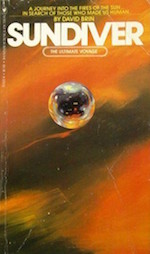 One indicator of a good space opera is that it gives readers the chance to encounter strange new beings. In the Uplift Universe, the human race has experimented with dolphins and simians, uplifting them toward sapience; and then humanity finds the stars filled with alien races, races who have uplifted each other. Each new race benefits from their patrons, who protect them as they develop…but the seemingly orphaned humans have no patrons, which causes them to be greeted with suspicion. Two books in this series stand out from the others: Startide Rising follows the crew of the starship Streaker, a mix of dolphins, humans, and one chimpanzee, who find an ancient derelict fleet of starships and end up stranded on a distant world, fighting for survival. The Uplift War takes place on a planet colonized by humans and neo-chimps, invaded and held hostage by the alien Gubru in order to force the humans to reveal what the Streaker discovered. The central concept of uplift is intriguing, and this big universe is filled with strange aliens and wonder. This series is extremely popular, and many fans would like Brin return to this setting; in the last several years, the author himself has mentioned possible plans for at least one more book in the Uplift Universe.
One indicator of a good space opera is that it gives readers the chance to encounter strange new beings. In the Uplift Universe, the human race has experimented with dolphins and simians, uplifting them toward sapience; and then humanity finds the stars filled with alien races, races who have uplifted each other. Each new race benefits from their patrons, who protect them as they develop…but the seemingly orphaned humans have no patrons, which causes them to be greeted with suspicion. Two books in this series stand out from the others: Startide Rising follows the crew of the starship Streaker, a mix of dolphins, humans, and one chimpanzee, who find an ancient derelict fleet of starships and end up stranded on a distant world, fighting for survival. The Uplift War takes place on a planet colonized by humans and neo-chimps, invaded and held hostage by the alien Gubru in order to force the humans to reveal what the Streaker discovered. The central concept of uplift is intriguing, and this big universe is filled with strange aliens and wonder. This series is extremely popular, and many fans would like Brin return to this setting; in the last several years, the author himself has mentioned possible plans for at least one more book in the Uplift Universe.
Technic History (Poul Anderson)
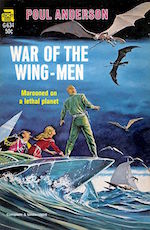 The grand sweep of history and massive star-spanning empires are key aspects of space operas. Chronicling the rise and fall of civilizations gives writers a large canvas to paint their stories upon: settings rich in drama and adventure, where larger-than-life characters can strive and struggle. Anderson’s Technic History follows humanity’s expansion into the stars and their struggles to maintain the civilization they have constructed. The earlier stories deal largely with the Polesotechnic League, a trading union that is the engine driving human expansion. The bombastic and colorful trader Nicholas van Rijn, head of the Solar Spice and Liquors Company, is at center stage for many of these tales. His protégé, the more cautious David Falkayn, continues van Rijn’s trading efforts as he becomes his own man. And, as capitalism and democracy give way to a decadent Terran Empire, the flamboyant and self-assured intelligence agent Captain Dominic Flandry struggles to hold back the “Long Night” that will inevitably follow the fall of the empire. Anderson’s characters are not always likeable, but they are always interesting, and their adventures never fail to entertain.
The grand sweep of history and massive star-spanning empires are key aspects of space operas. Chronicling the rise and fall of civilizations gives writers a large canvas to paint their stories upon: settings rich in drama and adventure, where larger-than-life characters can strive and struggle. Anderson’s Technic History follows humanity’s expansion into the stars and their struggles to maintain the civilization they have constructed. The earlier stories deal largely with the Polesotechnic League, a trading union that is the engine driving human expansion. The bombastic and colorful trader Nicholas van Rijn, head of the Solar Spice and Liquors Company, is at center stage for many of these tales. His protégé, the more cautious David Falkayn, continues van Rijn’s trading efforts as he becomes his own man. And, as capitalism and democracy give way to a decadent Terran Empire, the flamboyant and self-assured intelligence agent Captain Dominic Flandry struggles to hold back the “Long Night” that will inevitably follow the fall of the empire. Anderson’s characters are not always likeable, but they are always interesting, and their adventures never fail to entertain.
Robert Heinlein’s Juveniles
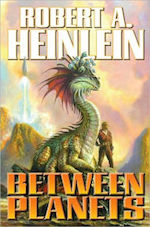 While Heinlein is best known for his Future History, he also wrote several “juveniles,” books that today would be classified for and marketed toward young adults. The stories are loosely connected, and follow humanity as it spreads through the solar system and into the stars. The stories often echo Heinlein’s theme of self-reliance in the face of the tendency of governments to decay into tyranny. Some feel dated, but all are still worth reading, and some stand out from the crowd. In Have Spacesuit—Will Travel, a young man repairs a spacesuit he won in a contest, not knowing this will be his ticket to achieve his dream of traveling into space. Tunnel in the Sky follows the adventures of a group of young people in a survival exercise who find themselves stranded, and the exercise becoming a real life and death struggle. Between Planets follows a young space-born man, without a country of his own, caught in a battle for independence between Earth and its colonies, in which the tyrants find it is not good to anger scientists.
While Heinlein is best known for his Future History, he also wrote several “juveniles,” books that today would be classified for and marketed toward young adults. The stories are loosely connected, and follow humanity as it spreads through the solar system and into the stars. The stories often echo Heinlein’s theme of self-reliance in the face of the tendency of governments to decay into tyranny. Some feel dated, but all are still worth reading, and some stand out from the crowd. In Have Spacesuit—Will Travel, a young man repairs a spacesuit he won in a contest, not knowing this will be his ticket to achieve his dream of traveling into space. Tunnel in the Sky follows the adventures of a group of young people in a survival exercise who find themselves stranded, and the exercise becoming a real life and death struggle. Between Planets follows a young space-born man, without a country of his own, caught in a battle for independence between Earth and its colonies, in which the tyrants find it is not good to anger scientists.
Galactic Center Saga (Gregory Benford)
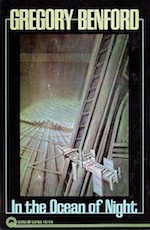 Adventure is sometimes defined as reading about someone else’s problems in the comfort of your own armchair. And the more desperate the situation for the protagonists, the greater the adventure. Benford’s Galactic Center Saga starts with In the Ocean of Night. In the near future, British astronaut Nigel Walmsley is sent to divert a comet that will strike Earth, and uncovers the existence of an alien mechanical civilization that spans the galaxy, which considers organic beings to be pests deserving extermination. The second book, Across the Sea of Suns, continues Walmsley’s story, as humans find remnants of a civilization in a nearby solar system destroyed by the machines, and Earth finds itself under attack from genetically engineered creatures. The third book, Great Sky River, jumps to the far future, where the Bishop family, heirs to the human race on the planet Snowglade, fight back against invading Mechs. Over the centuries, humanity has been engineered almost beyond recognition with cybernetic augmentation and mechanical implants. From there, the Saga continues over three more novels and a novella; the constant threats keep the reader gripped, and the pages turning.
Adventure is sometimes defined as reading about someone else’s problems in the comfort of your own armchair. And the more desperate the situation for the protagonists, the greater the adventure. Benford’s Galactic Center Saga starts with In the Ocean of Night. In the near future, British astronaut Nigel Walmsley is sent to divert a comet that will strike Earth, and uncovers the existence of an alien mechanical civilization that spans the galaxy, which considers organic beings to be pests deserving extermination. The second book, Across the Sea of Suns, continues Walmsley’s story, as humans find remnants of a civilization in a nearby solar system destroyed by the machines, and Earth finds itself under attack from genetically engineered creatures. The third book, Great Sky River, jumps to the far future, where the Bishop family, heirs to the human race on the planet Snowglade, fight back against invading Mechs. Over the centuries, humanity has been engineered almost beyond recognition with cybernetic augmentation and mechanical implants. From there, the Saga continues over three more novels and a novella; the constant threats keep the reader gripped, and the pages turning.
The Mote (Jerry Pournelle and Larry Niven)
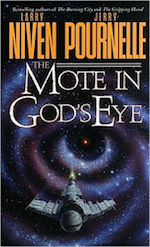 You don’t need to cross the entire galaxy in a space opera—some stories can pack their adventure into a very small corner of space. The star system of the Mote is one such setting. Either Niven or Pournelle could have made this list on his own: Niven for the tales set in his Known Space universe, and Pournelle for military SF adventures in his CoDominium/Empire of Man series. In the Mote stories, Pournelle’s militaristic Empire encounters an alien species in a system cut off from the rest of the universe, a species that ranks among the strangest Niven has ever created. The first book, The Mote in God’s Eye, is notable for its worldbuilding and tense narrative, while the second book, The Gripping Hand, has some of the best space battles ever written, and brings the tale to a satisfying conclusion. We see heroism, greed, redemption, politics, and all the other traits of humanity come into conflict with a race that has motivations, strengths and weaknesses that are unlike anything those humans have ever before encountered. The science is solid, the characters and societies feel real, and everything moves at a rollicking pace.
You don’t need to cross the entire galaxy in a space opera—some stories can pack their adventure into a very small corner of space. The star system of the Mote is one such setting. Either Niven or Pournelle could have made this list on his own: Niven for the tales set in his Known Space universe, and Pournelle for military SF adventures in his CoDominium/Empire of Man series. In the Mote stories, Pournelle’s militaristic Empire encounters an alien species in a system cut off from the rest of the universe, a species that ranks among the strangest Niven has ever created. The first book, The Mote in God’s Eye, is notable for its worldbuilding and tense narrative, while the second book, The Gripping Hand, has some of the best space battles ever written, and brings the tale to a satisfying conclusion. We see heroism, greed, redemption, politics, and all the other traits of humanity come into conflict with a race that has motivations, strengths and weaknesses that are unlike anything those humans have ever before encountered. The science is solid, the characters and societies feel real, and everything moves at a rollicking pace.
Liaden Universe (Sharon Lee and Steve Miller)
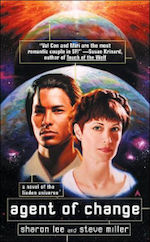 Space opera is often notable for its ability to bring romance and interpersonal relationships to the fore in compelling ways. In the far future setting of Agent of Change, a mercenary, Miri Robertson, encounters an intelligence agent and scout, Val Con yos’Phelium, who is fighting the effects of brainwashing, and in the course of dealing with their troubles, the two fall in love. There are three distinct human civilizations in this future: the formal and custom-bound Liaden, the less disciplined Terrans, and the warlike Yxtrang. There is also an intelligent race of giant turtles and at least one intelligent tree, and the many cats portrayed in the series are so clever they may as well be considered an intelligent race. Interstellar commerce is conducted by independent traders, with pilots highly prized members of an exclusive guild. Val Con is a member of the Liaden Clan Korval, and the series largely deals with the members of his extended family, with intrigue, action, and large dollops of romance. Counting short story collections, there are now more than twenty volumes in the series, with more in the pipeline.
Space opera is often notable for its ability to bring romance and interpersonal relationships to the fore in compelling ways. In the far future setting of Agent of Change, a mercenary, Miri Robertson, encounters an intelligence agent and scout, Val Con yos’Phelium, who is fighting the effects of brainwashing, and in the course of dealing with their troubles, the two fall in love. There are three distinct human civilizations in this future: the formal and custom-bound Liaden, the less disciplined Terrans, and the warlike Yxtrang. There is also an intelligent race of giant turtles and at least one intelligent tree, and the many cats portrayed in the series are so clever they may as well be considered an intelligent race. Interstellar commerce is conducted by independent traders, with pilots highly prized members of an exclusive guild. Val Con is a member of the Liaden Clan Korval, and the series largely deals with the members of his extended family, with intrigue, action, and large dollops of romance. Counting short story collections, there are now more than twenty volumes in the series, with more in the pipeline.
Babylon 5 (J. Michael Straczynski)
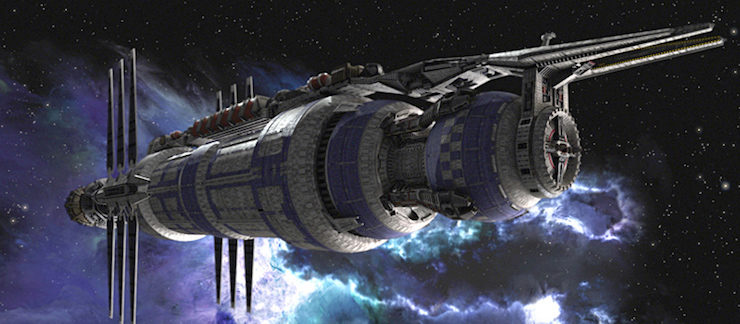
If you ignore media like TV and movies, you will miss some of the best space opera universes. The visual media is perfect for big, sprawling stories, and here, Straczynski has created an innovative and immersive setting for grand adventure. Babylon 5 is a space station established by humans, rather primitive newcomers, in order to open relations and trade with the many races that inhabit the galaxy. Alien races the humans interact with include the warlike Narn, the sybaritic Centauri, and the spiritual Minbari. The mysterious Vorlons support human efforts, but are opposed by the spider-like Shadows. The show was innovative in abandoning the traditional episodic structure after its first season, instead relying on a strong story arc that allowed the tale to build to an epic conclusion. The series also used computer graphics instead of models to portray its spaceships and other worlds; combined with careful set design and production scheduling, this allowed the show to function with a very modest budget. Babylon 5 also put a strong focus on its characters, and their development and growth over time. The result is one of the greatest science fiction epics to appear on television.
Zones of Thought (Vernor Vinge)
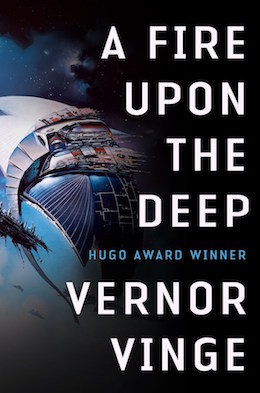 Some of the best space opera plays with the laws of nature to create an exciting universe. In the late 1980s, Vernor Vinge realized that technological advances threatened the space opera settings he enjoyed in his youth. His solution was to develop a concept partitioning the galaxy into the “Zones of Thought.” Earth is in the “Slow Zone,” where travel and communications are limited to lightspeed, and superhuman intelligence is impossible. At the galactic core, the “Unthinking Depths,” even human-level intelligence is impossible. In the galactic fringe, the “Beyond,” the speed of light is no longer a limiting factor, and superhuman intelligences thrive. The series includes four works; a novelette, “The Blabber,” and three novels: A Fire Upon the Deep, A Deepness in the Sky, and Children of the Sky. Alien races include the Tines, seal-like creatures who only become sentient when they work in packs, and the Skrodriders, sentient plants in symbiotic relationships with mechanical carts known as Skrods. Humans are constantly tempted by the magical technology of the Beyond, but along with that technology comes unimaginable threats as well. The stories are a joy, full of adventure and wonder, epic battles and exploration.
Some of the best space opera plays with the laws of nature to create an exciting universe. In the late 1980s, Vernor Vinge realized that technological advances threatened the space opera settings he enjoyed in his youth. His solution was to develop a concept partitioning the galaxy into the “Zones of Thought.” Earth is in the “Slow Zone,” where travel and communications are limited to lightspeed, and superhuman intelligence is impossible. At the galactic core, the “Unthinking Depths,” even human-level intelligence is impossible. In the galactic fringe, the “Beyond,” the speed of light is no longer a limiting factor, and superhuman intelligences thrive. The series includes four works; a novelette, “The Blabber,” and three novels: A Fire Upon the Deep, A Deepness in the Sky, and Children of the Sky. Alien races include the Tines, seal-like creatures who only become sentient when they work in packs, and the Skrodriders, sentient plants in symbiotic relationships with mechanical carts known as Skrods. Humans are constantly tempted by the magical technology of the Beyond, but along with that technology comes unimaginable threats as well. The stories are a joy, full of adventure and wonder, epic battles and exploration.
Spiral Arm Sequence (Michael Flynn)
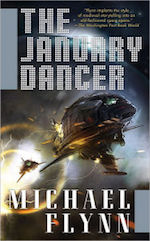 Sometimes, even hard science fiction writers feel the siren call of high adventure, and set their sights on the far future, and heady times of myth and legend. Once such author is Michael Flynn, who has written four books set in a time where ancient Terra is only a legend. The January Dancer is a tale told to a wandering harper involving an ancient alien MacGuffin and the tramp freighter crew that finds it. In Up Jim River, that harper, Mearana, takes center stage. She is seeking her missing mother; an intelligence agent or “Hound” named Bridget, and enlists Donovan, a former rival whose mind has been shattered due to torture. With In the Lion’s Mouth, it is now Donovan who is missing, and a Shadow, Ravn Olafsdottr, a rival to the Hounds, approaches Bridget and Mearana with news of his fate. On the Razor’s Edge brings the series to its conclusion, as we find that Donovan’s fragmented memory holds the key to the fate of warring civilizations. The intelligence agents evoke ancient orders of chivalry, and the relationships between the well-drawn characters are poignant. The series is a joy to read, and well worth a look.
Sometimes, even hard science fiction writers feel the siren call of high adventure, and set their sights on the far future, and heady times of myth and legend. Once such author is Michael Flynn, who has written four books set in a time where ancient Terra is only a legend. The January Dancer is a tale told to a wandering harper involving an ancient alien MacGuffin and the tramp freighter crew that finds it. In Up Jim River, that harper, Mearana, takes center stage. She is seeking her missing mother; an intelligence agent or “Hound” named Bridget, and enlists Donovan, a former rival whose mind has been shattered due to torture. With In the Lion’s Mouth, it is now Donovan who is missing, and a Shadow, Ravn Olafsdottr, a rival to the Hounds, approaches Bridget and Mearana with news of his fate. On the Razor’s Edge brings the series to its conclusion, as we find that Donovan’s fragmented memory holds the key to the fate of warring civilizations. The intelligence agents evoke ancient orders of chivalry, and the relationships between the well-drawn characters are poignant. The series is a joy to read, and well worth a look.
The Lost Fleet (Jack Campbell)
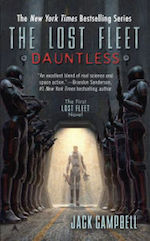 Sometimes, space opera exists as a framework for some truly epic space battles. Jack Campbell is the pen name of John G. Hemry, a retired U.S. Navy officer. In The Lost Fleet: Dauntless, an Alliance fleet is moving toward a final clash with the Syndicate Worlds, and discovers an escape pod containing a man floating in suspended animation for a century. It is Captain “Black Jack” Geary, a legend from an early battle in the war. Geary finds the fleet much more brutal, hardened by decades of warfare. When the fleet is trapped, the Admiral leaves to negotiate surrender, and puts Geary in charge (after all, he has one heck of a “date of rank” when compared with the other captains). When the Admiral is executed, Geary decides the fleet should fight their way out, and the series describes their epic battle to get home. Campbell does a great job setting up massive fleet actions, and presenting them in a clear manner, not an easy feat. The series functions as a meditation on military virtues, as Geary struggles to be true to principles society has abandoned. Those who enjoy the books will have plenty to read, as it has spun off into two related series.
Sometimes, space opera exists as a framework for some truly epic space battles. Jack Campbell is the pen name of John G. Hemry, a retired U.S. Navy officer. In The Lost Fleet: Dauntless, an Alliance fleet is moving toward a final clash with the Syndicate Worlds, and discovers an escape pod containing a man floating in suspended animation for a century. It is Captain “Black Jack” Geary, a legend from an early battle in the war. Geary finds the fleet much more brutal, hardened by decades of warfare. When the fleet is trapped, the Admiral leaves to negotiate surrender, and puts Geary in charge (after all, he has one heck of a “date of rank” when compared with the other captains). When the Admiral is executed, Geary decides the fleet should fight their way out, and the series describes their epic battle to get home. Campbell does a great job setting up massive fleet actions, and presenting them in a clear manner, not an easy feat. The series functions as a meditation on military virtues, as Geary struggles to be true to principles society has abandoned. Those who enjoy the books will have plenty to read, as it has spun off into two related series.
Final Thoughts
So there you have it—ten space opera universes I’ve enjoyed. Space operas offer some of the purest fun of any tales within the genre. They are full of big ideas, big marvels, and big adventures. And, like I said right from the start, the list is by no means complete, as my favorites could have included dozens more. I’ll now open the floor to you, and get your help rounding out the list. What are some of your favorite space operas? What elements drew you to those particular stories? What scientific shortcuts and clichés are you willing to overlook in pursuit of a good story? And what authors are best at writing big, impressive stories across a big canvas?
Alan Brown has been a science fiction fan for five decades, and likes nothing better than a good space opera that keeps him reading past his bedtime. He writes a monthly series for Tor.com reviewing classic science fiction books, many of which fall right into the space opera wheelhouse.










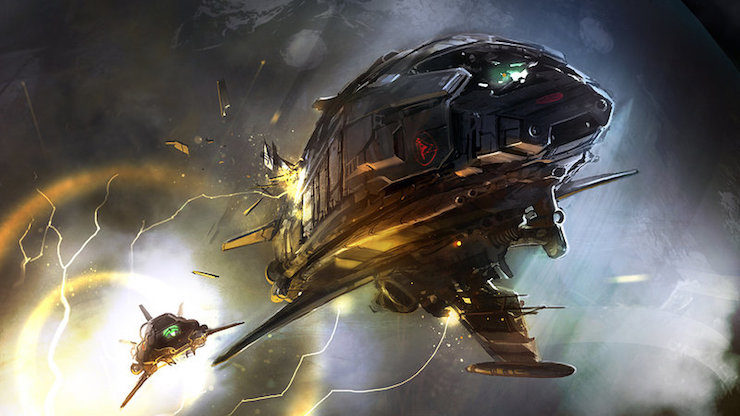
Nice article but no mention of the Honorverse? Should have been mentioned at least in the Introduction.
Understandable error here: the “Psychotechnic League” is not the same as the “Polisotechnic League.” Sorry, Poul Anderson, this one’s on you – don’t confuse your readers.
Just 10 of so many more – but not a bad place to start.
My favourites: Jack Vance’s several universes, Hammer’s Slammers series, the Bolo Series, H. Beam Piper’s various universes including Little Fuzzy, Larry Niven’s Known Space, Star Trek, Star Wars, the Starfire novel series and game….
Showing my age and love of cheese: Lensman!
Why? Action covers billions of years! Humans are pawns for aliens who are on our side but prevaricate so good they make Aes Sedai look like they are on truth serum! And the weapons: Antimatter bombs the size of planets! Nutcracker planets! Beams! Rays! What can I say?
I also cast a vote for Skylark, because the bad guy clearly twirls his moustache…
Also, is Foundation a space opera? If so, would the our favorite character sing tenor when he’s Magnifico and bass when he’s himself?
Iain Banks – Culture series – ’nuff said.
The Exordium Books!!! These are underappreciated treasures that need to be more widely promulgated if only to entice the authors into revisiting that universe. Epic space battles! Courtly (sexual) politics with a deadly edge. Space Pirates! Scoundrels and Socialites, Religious Fanatics and a truly weird alien species that thinks in the the number three! Plus, an eternal menace from pre-history waiting to ingest all of mankind.
They’d also make a very meaty, and engrossing re-read project, if ya take the hint.
C.J. Cherryh’s Alliance universe
@7: Yes, Cherryh is great! For space opera goodness I’d particularly mention the Chanur books, which are a loosely-connected subset of Union/Alliance.
A favorite standalone: Alastair Reynolds’ House of Suns.
And another relatively recent addition: Ann Leckie’s Ancillary novels.
For my tastes, the best writer currently working in this subgenre is Alastair Reynolds, who expertly delivers the subgenre’s standards of grand scale and deep time but adds in some bracing British cynicism and surprisingly reasonable scientific content.
One older author who doesn’t get as much mention as he should is John Brunner: certainly, some of the time it’s obvious he was writing them to pay the bills but he remains one of my go-to authors for interstellar entertainments. (And now I’ve remembered E. C. Tubb’s long-running series of Brackett pastiches, the Dumarest saga…)
Another vote for Lensman. I remember reading those when I was a teen and I thought they were the greatest books ever.
And a vote for John Carter of Mars. Not exactly in space so much, but still spiritually that genre.
No love for the Expanse?
I’ll chime in with The Xeelee Sequence by Stephen Baxter. Billions of years covered (millions just by humans), multiple universes, and the occasional time-travel adventure as various factions of baryonic species (humans included) try to become the dominant one able to challenge the mysterious Xeelee (who are meanwhile fighting their own battles).
Some of my favorites
Star of the Guardians by Margarete Weis
Forbidden Borders by W. Michael Gear
The Spider Trilogy by W. Michael Gear
The Four Lords of the Diamond by Jack L. Chalker
The Expanse by James S. A. Corey
The Giants by James P. Hogan
(In that order)
Just to start the list…..
@2 Thanks for that input, and I am working on getting that corrected. Because those terms are so familiar, I often get them confused.
And thanks to all who are adding to the list of our favorite space opera universes, especially those who are explaining what drew them to those particular stories. A list of ten cannot possibly contain all the good ones that have been written over the years!
In this thread I’ll give a vote to Modesitt’s ethics driven space operas – The Parafaith War and The Ethos Effect. Modesitt is always one to try something different, and these certainly do that.
David Weber & Steve White did the Starfire series, a novelisation of a gaming universe that had some of the best fleet scale battles I can remember outside of the Honorverse.
And the other one I’ll always have fond memories of is Alan Dean Foster’s Humanx Commonwealth, which encompasses such diverse worlds as the plant biome Midworld, the ice world Tran-ky-ky, the bear like Ulru-Ujurrians carefully rebalancing their world to avoid an ice age, and the wonderful silicon realm of Prism. Not to mention the delightful Pip and Flinx.
There’s also Greg Bear’s Forge of God/Anvil of Stars — the first book is a straight end-of-the-world disaster/invasion novel (relatively speaking), but the sequel is full-on space opera.
The Republic of Cinnabar Navy series by David Drake and the Honor Harrington series by David Weber are my two go-to space operas. Both are at least party inspired by the real-world naval officer Thomas Cochrane, with Drake going more with the Aubrey-Maturin take and Weber with Horatio Hornblower.
This one straddles the TV/prose divide, but the first sci-fi I ever fell in love with was the Robotech universe as written by “Jack McKinney” (Brian Daley and James Luceno), based on a story created by Carl Macek, based on three different anime that Macek Frankensteined together. Luceno & Daley were hired to write a series of novels at first adapting the TV series, then adapting Macek’s planned-yet-never-completed “fourth season” arc, and finally filling in gaps during the multigenerational series’ time-skips.
While the Robotech TV series are based on and around Earth (and in fact see Earth collapse from a spacefaring to a post-apocalyptic society), the Sentinels Saga takes the story to the far side of the galaxy, where the empire of the Robotech Masters is collapsing under the Invid onslaught (which they themselves caused by destroying the Invid homeworld), and where the former slaves and vassals (and even some enemies) band together to forge a new alliance –and to survive the Awakening of the long-slumbering god that seeded those worlds with the Flower of Life (upon the seeds of which were the Robotech Masters established).
My all-time favorite has to be James H. Schmitz’s “Federation of the Hub”. I reread the Hub stories all the time. This year alone I’ve read the Telzey Amberdon stories twice and am partway through a collection of others. When I load up a new phone (in my line of work, a fairly common requirement), those books are on the list of ‘must-have’ items.
I love me the Hub.
The Bobiverse has been a surprising revelation. And Old Man’s War of course.
I don’t really think of myself as a space opera fan, but I guess I must be since this is the first list where I have read and enjoyed the majority of the entries (8/10 in this case).
Just like @@.-@ Dr. Thanatos and @10 ragnarredbeard, I’m a Doc Smith fan, but in addition to the Lensman, I love the Skylark series. Looking back, I’m more squeamish about the authoritarian aspects, but for sweep of imagination and vastness of the vast, incomprehensibleness, it’s hard to beat the Doc.
One thing I associate with space opera that doesn’t seem to be important to anybody else is the narrative urgency it inherited from the pulps. IMO opinion, the best space opera are page turners which carry you past any little problems with characterisation or motivation at hectic pace.
Damn, now I have to dig out my copies of Jack Williamson’s Legion of Space; which are many cardboard boxes deep ever since I switched to reading electronically fifteen years ago.
@21 vinsentient I had forgotten about the Legion of Space (not to mention the Legion of Time!). I got to dig up my copies now!
So many more I would have included, Bujold and Cherryh for a start.
Iian Banks culture. Dan Simmons Hyperion. Several of Jack Vances series.
Surprises me the love for E.E. Smith. Some of the worst written books ever published.
@23 Glad you brought up Bujold. She had been on my original list, but since her Vorkosigan series is currently the focus of a reread on this site, I replaced her with an older work that might otherwise have been overlooked. Her work is an absolute delight. And if my late dad had been drawing up the list, Cherryh would have been near the top.
As a James S.A. Corey fanboy I must protest the absence of The Expanse from the list of space operas!
I would second the nomination of including the work of Alastair Reynolds, but how could you mention Reynolds without mentioning his best-selling British countryman, Peter F. Hamilton. He has not one but two amazing space opera universes, the Commonwealth saga that includes Pandora’s Star, Judas Unchained and the entire Void trilogy, not to mention his latest duopoly The Chronicle of the Fallers. IMHO, nobody does space opera better.
Hamilton also has the ultimate space opera in the Confederation Universe in which his epic trilogy The Night’s Dawn (The Neutronium Alchemist, The Reality Dysfunction and The Naked God ) is set.
Two things:
I am a little startled at the high proportion of work here that I’d characterize more as military SF than space opera proper — notably the Lost Fleet series and the Weber and Drake entries (although the Honorverse has sprawled out enough that parts of that material really do fit better under the space opera umbrella).
However, what woke me right up out of a much-needed afternoon nap was the realization that no one has yet mentioned my own longtime favorite space opera cycle — the Mageworlds novels by Debra Doyle and James Macdonald, beginning with The Price of the Stars. For my money, nobody else has done a better job of synthesizing the best parts of Andre Norton (whose Solar Queen series belongs here too, darnit!) and the Star Wars movies (and a lot of other classic nods besides), flipping them inside out and sideways, and creating some of the sharpest straight-ahead page-turners of their kind, complete with kick-ass female leads before people had really started complaining about the lack thereof. In particular, I’ve seen very little else that does as good a job of blending high-octane space adventure and mystical/magical elements (very much in the Star Wars mode) as these books accomplish.
And they’re available as ebooks, so there’s no excuse for people not to go snarf them up. (I strongly recommend reading these in publication order, as numbered on the linked page, as opposed to internal chronological order. It’s that kind of series….)
Robotech. A thousand times Robotech :)
Transforming spacecraft, dogfights in space, love, music, aliens, lots and lots of explosions, and the greatest love song in the universe.
@27
I must admit I preferred Space Opera in its scientific exploration or just plain old adventuring hero (although the latter is problematic since it trades on a lot of the same tropes as the old colonial adventure novels, complete with “savage natives who need tamed” narratives) than I do milSF space opera, which too often seems to glorify military for the sake of militarism tropes.
Don’t forget other foreign Space Opera series….
Perry Rhodan…weekly for over a half century, and still going strong.
I’d add the Mass Effect trilogy and the Macross franchise
So pleased to see the Liaden Universe make this list. I’m not going to try to claim Agent of Change is a perfect book, but it’s easily in my Top 5 favorite books, fiction or nonfiction.
Keith Laumer’s Retief to get a lighter side to your space opera, and H. Beam Piper’s Paratime if you want your space opera without leaving earth, though he’ll also let you go a viking if you must.
@LadyBelaine: Smith & Trowbridge did do a partial rewrite ( or expanded edit I suppose) a few years back. Added a bit to the world building of the setting. Also more dogs.
A hearty second for Baxter’s Xeelee Sequence, and to include S.P. Somtow’s Chronicles Of The High Inquest as excellent space opera; as a composer he also writes actual operas.
No mention of Jack McDevitt??
*GASP*
Love me some Priscilla Hutchins or Alex Benedict.
Buck Rogers, duh!
The Solarians by Norman Spinrad
Cowboy Bebop
Harry Harrison’s The Stainless Steel Rat/
Deathworld
The Gap Cycle by Stephen R. Donaldson
The Faded Sun, also from Cherryh*
*I was impressed with myself until I saw the lead art on the Dark to Dark post :(
I do like tension, but I still want to nuke the Moties to extinction.
John Scalzi’s Old Man’s War series. It is just amazing and when you are reading the series it gives you shivers at how really it seems. The author has considered the little things and expanded them, for example one of the central ideas if why would you want young people, when you can have older more experienced people to be soldiers.
I’m surprised no one mentioned the Foundation trilogy.
I wonder into and out of liking space opera; when it’s good, it’s great entertainment. I also think it’s probably very hard to write good space opera, as a lot of it sinks deeply into all the flaws that gave sf a bad name: stodgy writing, stale plots, rancid stereotyping, and characters that barely make it to one dimension.
I’ll add my vote for Iain Banks’ Culture novels and Baxter’s Xelee sequence.
Anyone picking up The Mote in God’s Eye (Niven & Pournelle) for the first time probably needs a warning about the start. I don’t know if it was intended to be an homage to the golden age or meant to be ironic…or just a sign of the times but I found it truly painful on re-reading. ….But then it turned spectacular! If its your first time then persevere because you’re in for a rollicking good ride.
…and Neal Asher!?!? Killer robots, world-ruling AIs and two of the greatest aliens ever in the Prador and the Gabbleduck. And I want a nickname like UCAP.
1) Asimov Foundation and all the others which “precede” them (Robots, etc)
2) I love Banks “Culture,” but I think my favorite is The Algebraist, which is stand alone. His villain is so awesome – cuts off the head of an adversary but keeps it alive and upside down as a punching bag. Gaaaah, that’s cool.
2) Peter F. Hamilton – both of his universes
In his pre-Game of Throne days, George R.R. Martin wrote a few stories about Haviland Tuf, a trader who becomes the captain of an ecological survey ship capable of destroying or healing worlds. These were set in the same universe as another novel, Dying of the Light. Interesting aliens and future events, and Tuf is downright Machiavellian
How can we discuss Space Opera without Edmond Hamilton, the ol’ world wrecker himself!
LurkerWithout @@@@@ 34 –
I know! The low wattage buzz about those ‘expanded edits” is what brought them to my attention. I really cannot recommend them enough. They among the best Space Opera Sci-Fi I’ve ever read.
Seconding Dr. Dredd’s vote for GRRM’s Thousand Worlds universe, which was truly epic in scale and theme and which (heresy, I know) I like a lot more than his latter-day fantasy.
And if the Federation of the Hub is in the running, surely Witches of Karres should be likewise.
Second the nomination of Neal Asher to this list. And no love for Alastair Reynolds, Revelation Space series or many of the other books that he has written?
For shame….
@47: Ahem, see my comment @9…
@46 Oh yes Karres (not so much the sequels). I wanted to date Goth when I read this as a teen. The Leewit was a little to scary for me…
another vote for Neal Asher’s Polity universe. Consistently original, daring and about as sweeping in scope as any of the others mentioned.
All the variious DUNE books together form one of the greatest of space operas of all time. It is actually multiple space opera stories all at once. Serena Butler is one of the great tragic stories, where a single event in a person’s life caused a whole universe to shake. The Atreides, Corrinos, and Harkonnes have one of the longest, darkest histories in Science fiction, filled with romance, tragedy, politics, religion, and economics on one of the grandest scales ever seen.
I’ll definitely second your vote on the Uplift Saga, Heinlein’s juveniles, B5, the Moties, and the Galactic Center. Here are some of my faves:
Foundation Trilogy (yeah, yeah, more Galactic Empire than space opera. get offa my lawn)
Heinlein’s Future History series (Lazarus Long & co.)
Lois McMaster Bujold’s MILES VORKOSIGAN series
E.E. Doc Smith’s LENSMAN series
Keith Laumer’s RETIEF series
Elizabeth Moon’s VATTA’S WAR and SERANO LEGACY series
Ursula K. LeGuin’s HAINISH Cycle (stretching the definition of space opera a bit)
Larry Niven’s KNOWN UNIVERSE
John Scalzi’s OLD MAN’S WAR series and his new COLLAPSING EMPIRE series
Iain M. Banks’ CULTURE series
Catherine Asaro’s SKOLIAN EMPIRE
Neal Asher’s POLITY series
Allen Steele’s COYOTE series
Harry Harrison’s STAINLESS STEEL RAT series
Jack McDevitt’s ALEX BENEDICT series
James S.A. Corey’s EXPANSE series
Frederik Pohl’s GATEWAY series (not strictly space opera)
Nnedi Okorafor’s BINTI series (again, not strictly space opera)
Great comments and great lists but I didn’t see John Ringo’s Poleseen/Aldenta world mentioned here or his Hot Gate series, short as it may have been. He writes great and imaginative Military SciFi and the best “zombie” series out there.
Anderale’s Kurtherian Universe is a new Fave that has several additional writers adding to the theme.
And so many more- from ten to a hundred to a thousand worlds and universes to explore in our minds and maybe if we survive long enough, in reality- here’s hoping we stay around long enough to make that journey.
@49 Roxana not to mention Captain Future!
What, no love for the Peltedverse? Earthrise is one of my favorite space operas.
How about Fred Saberhagen’s Berserker series?
Love some of these authors and stories so much!
EE ‘Doc’ Smith’s LENSMAN was my introduction to Space Opera concepts in book form, of course it’s dated and obsolete now, but definitely a nostalgia read
Fred Saberhagen’s BERSERKER series was about the same time for me – world munching machines of evil :-)
Jack Campbell’s LOST STARS universe
Jack McDevitt’s ALEX BENEDICT and PRISCILLA HUTCHINS series are both awesome in different ways
MacDonald and Doyle’s MAGEWORLDS is an awesome series that will do some mind bending for you :-)
Harry Harrison’s STAINLESS STEEL RAT
Heinlein – just about anything :-)
C S Friedman – standalones – The Madness Season, This Alien Shore, In Conquest Born and a lot of hybrid SF/Fantasy series
There’s many others out there – C J Cherryh, a lot of Asimov, etc
Have not read all mentioned but the ones that spring into my mind without any thought at all were the Skylark and Lensmen series (the first ones I remember reading)! Another favorite were The Cities In Flight novels written by James Blish (remember the Spindizzies and the immortality drugs)?
It is interesting how you have a post up about how women do in fact write space opera, then your list has .5 women in it. In this genre especially getting parity, or near, shouldn’t have been hard.
OK, I’m in for the Honorverse by Weber, Graveyard Sky series and Hot gate series by Ringo, (Posleen is Mil Sci Fi for sure)
Known universe by Niven, Foundation by Asimov Alan Foster : Pip and Flinx series is solid gold to me.
Saberhagen’s Berserkers and such are good, And Yes, a lot of Heinlein stuff.
BUT WHERE IS The Dragonriders of Pern Series by Anne McCaffrey ????
Yes, A Woman wrote Awesome Sci Fi in an epic series.
so many many awesome old books.
What about Murray Leinster, one of the great space opera writers of the forties, fifties and sixties? And Leigh Brackett? And heck, Joan D. Vinge’s Snow Queen and Cat novels? Not to mention Clifford D. Simak–maybe not quite so space opera-ish. Also, William Tenn, to some degree..
I love all of the nominations of everybody who made comments. I love all of them, including E. E. “Doc” Smith. I’d also add Doc’s Spacehounds of IPC and the Subspace books (Subspace Explorers, Subspace Encounters). and The Galaxy Primes. Let’s add John W. Campbell’s Arcot, Wade, and Morey books: The Black Star Passes, Islands of Space, Invaders from the Infinite. Let’s also add his Aarn Munro books (The Mightiest Machine, The Incredible Planet, The Infinite Atom, The Interstellar Search ) and the Penton and Blake stories (The Brain Stealers of Mars, The Immortality Seekers, The Tenth World, The Brain Pirates, and The Planeteers).
There are so many great space operas. It’s hard to narrow it down to a few.
Mike Resnick’s Birthright Universe has spawned dozens of books and short stories. Poignant, character driven stories with a message. Oracle and Widowmaker trilogies offer brilliant character studies, “Ivory” explores the best and worst of human nature.
DC Comics’ Legion of Super-Heroes created one of the most intricate and brilliant space epics from the 1960s through the 1990s, until the reboots hit. Multiple alien species come together to protect the galaxy from threats, fall in love, get killed, and even grow from teenagers into adults jabbing children of their own. It got really hard sci-fi just before the “five years later” relaunch of 1989.
Lots of good mentions from others already and not much more I can add except:
If you like B5, the novels set within the B5 universe are definitely worth it too, particularly the Psi Corps ones.
Dune is a classic, maybe one of the first Space Operas that meet both the old and definition. I was so surprised to see it mentioned only once, and that in the comments.
One of my favorite space opera settings is Brian Stableford’s Hooded Swan galaxy, an intelligent take on a lot of space-opera tropes, such as shipwrecks, lost colonies, alien conspiracies and slightly mad scientists. The main character is a cynical space pilot with an alien sentient mind parasite. Read more about it here on my blog – link >>
I am a huge fan of the Lensman series, which to my mind is the prototype for all space opera. I still reread them every few years.
@59 My list represents ten space opera universes that I’ve enjoyed, drawn up without regard for who wrote them. We all have different tastes, and I knew my short list, while it did present some good older examples of space opera, did not represent the full diversity of SF, especially from newer writers. That’s why I stressed the point that others should join in the conversation by sharing their own favorites. I’m glad that TOR.com balanced my piece with Judith Tarr’s piece on women who have written space operas, as her piece shows a lot of works deserving of mention that didn’t appear in my list. Diversity doesn’t result from all of us thinking the same, and each of us drawing up the same list, it comes from individuals with different backgrounds, viewpoints and opinions coming together with mutual respect. And I’m proud that TOR.com allows me to contribute to their website, which supports vigorous and diverse discussion of all aspects of SF.
(Oh, and I assure you that, while she co-writes with her husband, Sharon Lee is a whole person, not just 0.5 of a person.)
@62 I had more trouble with Campbell’s trilogy—way too much “let’s pause and explain the science” nevertheless a classic series
@61 Broadway Jimmy
While not space opera per se, William Tenn’s Of Men and Monsters is an old favorite of mine :D
What? Where’s the love for Scott Westerfeld’s Risen Empire & The Killing of Worlds? The first 50 pages or so of Risen Empire was the best battle sequence I’ve ever read, hand’s down.
I think Dan Simmons’ Hyperion series (Hyperion, The Fall of Hyperion, Endymion, The Rise of Endymion) qualifies, especially given all of its big ideas and adventure.
Personally, it is my favourite series.
When I was 11, I wanted to run off with Blackie Duquesne. I can’t remember if I wanted to Redeem Him With Love Of A Good Woman, or go off and be a pirate, too. At that age, it can go either way. <G>
But let’s not forget the Ozark Trilogy by Suzette Haden Elgin–I mean, there has to be room for Grand Old Space Opry. A universe like that shouldn’t be missed, and the writing was frickin’ brilliant and lyrical.
I am an old SF reader (started in the 70’s), and have read many of the works mentioned here, but I would like to include a very recent addition to this honored list: Hannu Rajaniemi’s Jean Le Flambeur’s novels (“The Quantum Thief,” “The Fractal Prince,” and “The Causal Angel”). There are no aliens, but the human race has expanded and changed in multiple ways, so much as to be equivalent to a cast of alien races. Also, there is no galaxy-spaning canvas: The story is limited almost completely to the solar system, all the way to the Oort cloud. But the sense of wonder and adventure are on a par with any of the masterpieces of the genre. This work (as well as “Accelerendo” by Charlie Stross) brought me back to SF after a long hiatus when I felt a little underwhelmed by what SF was producing, with notable exceptions. They are in my “Hall of Fame,” along with masterpieces like Brin’s Uplift Universe series and Herbert’s Dune saga (another all-human cast of “alien” races).
@74, if you’re going to mention Suzette Haden Elgin, don’t forget the Coyote Jones/Communipath books, including their collision with Planet Ozark in Yonder Comes the Other End of Time.
I’d also like to put in a word for Catherine Asaro’s Skolian Empire saga, which contains war, adventure, exploration, and romance set on a background of far-flung empires.
Julie Czerneda’s Clan Chronicles are certainly epic enough to qualify, and I think a good case could be made for her Web Shifters books as well.
I’m also a little surprised not to see James Alan Gardner’s League of Peoples books mentioned. Definitely worth reading.
LadyBelaine @@@@@ 45 said (regarding Exordium by Sherwood Smith & Dave Trowbridge):
Thanks for this list. I have enjoyed the Liaden Universe by Lee & Miller, but it is a slow ride to closure. That’s a good thing and yet a bit frustrating.
I am intrigued by your description of the series by Michael Flynn and will pick up a copy of January Dancer.
In addition to all the great suggestions on this post / comments, I will add or reiterate a few:
Vorkosigan Series (Bujold)
Spiral Wars Series, with three books so far, more to come (Shepherd)
Linesman series, with 3 books so far, more to come (Dunstall)
The Expanse book series / TV series (Corey)
Fallen Empire series — lightweight, with some romance (Buroker)
Also, there are several books that continue the Stargate Atlantis TV series, including books about the Wraith (Graham, Scott, & Griswold)
I really love this selection for sure! Good choices. I could easily see Battlefield Earth being added to this list of all time great space opera!
I would second the mass effect trilogy. The storytelling in those 3 games spans amazing planets throughout a large galaxy, and the story itself is the best I’ve read or watched since the original Star Wars trilogy. I would also add the renegade star books by J.N Chaney. A fun space opera, with interesting characters and storylines.
My God, man, the Culture!
“Either Niven or Pournelle could have made this list on his own: Niven for the tales set in his Known Space universe, and Pournelle for military SF adventures in his CoDominium/Empire of Man series. “
“The Mote in God’s Eye” is set in the CoDominium/Empire of Man universe.
Doc Smith, of course! Love both the Lensman and Skylark universes. Well, and the Spacehounds of IPC universe and the Subspace universe and the Galaxy Primes universe.
(Sadly, do not really love the D’Alembert universe or the Lord Tedric universe; but I’ve read them multiple times just to be sure.)
I second poster #80’s recommendation for SK Dunstall’s Linemen series.
Love most of these!
Here’s a few more –
SK Dunstall’s Linesman (not Lensman) series.
Timothy Zahn’s Quadrail series (railroads and spy thrillers in space!)
James White’s Sector General series
Okay, I am surprised that no one’s mentioned Larry Niven’s “Known Space”, a future history filled with creative ideas, weird alien races, including the terrifying Puppeteers, the most dangerous race of pacifistic herbivores one could hope to meet, and the warlike Kzinti, the super intelligent Pak Protectors, and many more. Memorable and filled with harder science than many space opera settings. Stasis fields, General Products hulls, the Blind Spot, and of course the Ringworld!
Glynn Stewart’s several series also merit a good mention, particularly the timeline that begins with “The Terran Privateer”. His “Protectorate of Mars” novels are also hugely fun with an interesting world and some memorable characters.
I have also loved the Lensman books & the Skylark books by Doc Smith. All of the Robots/Foundation stories of Azimov, Brin’s wonderful Uplift universe, and last but not least: James Schmitz in both his Hub stories and his Confederacy of Vega stories.